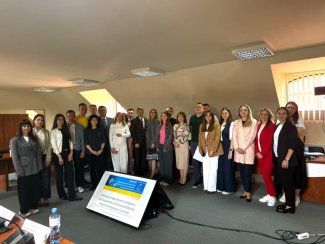Contact center of the Ukrainian Judiciary 044 207-35-46

In order to support and facilitate the acceleration of legislative reforms in the field of cybercrime and electronic evidence, the Council of Europe's CyberUA project held a workshop on harmonising national legislation in the field of electronic evidence in line with the requirements of the Convention on Cybercrime (Budapest Convention) and implementing legal reforms in the context of the requirements of the Second Additional Protocol to the Convention.
The seminar was attended by Oleksandr Marchuk, President of the Criminal Cassation Court of the Supreme Court, Serhii Yeremeichuk, Supreme Court judge in the CrimCC, Olha Buleiko, judge of the Grand Chamber of the Supreme Court, and Olha Brynzanska, Head of the Division of Analytical and Legal Work of the Criminal Cassation Court of the Supreme Court's Department of Analytical and Legal Work.
As of 2025, the Criminal Code of Ukraine establishes liability for virtually all acts that the Budapest Convention defines as offences. In particular, the Criminal Procedure Code of Ukraine provides for search, arrest and retrieval of information from computer systems. Although it is not explicitly stated, it can be concluded that covert access to a computer system without the knowledge of its owner also includes, if necessary, additional network searches. This is partly in line with Article 19 of the Budapest Convention.
We can also talk about the partial implementation of the provisions of Article 14 of the Convention on the scope of procedural provisions. Thus, the Criminal Procedure Code of Ukraine does not deny the possibility of collecting evidence in electronic form, but does not provide for such type of evidence as electronic evidence, nor the specifics of their procedural sources, nor the procedure for collecting evidence.
This was emphasised by Oleksandr Marchuk, the President of the SC CrimCC, in his speech.
Oleksandr Marchuk also noted that at the same time, Articles 16 and 17 of the Convention, which relate to the urgent preservation of computer data and the urgent preservation and partial disclosure of data on the movement of information, remain unimplemented.
Ukrainian legislation does not yet provide for mechanisms that would allow for the urgent preservation of relevant data or ensure their partial disclosure to identify the sources and route of information transmission.
This event brought together judges, law enforcement and government officials to discuss the process of reforming the criminal procedure legislation of Ukraine.
Participants supported the acceleration of legislative reforms in the field of cybercrime and electronic evidence in line with the Budapest Convention and agreed on the main areas of reform, focusing on compliance with the Convention's requirements on procedural powers.